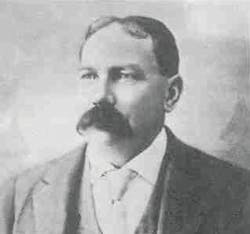This month’s Legendary Lawman is the third member of the “Three Guardsmen”: Deputy U.S. Marshal Chris Madsen. These deputies worked the Indian Territory that was an area of more than 70,000 square miles and was, until 1875 when Judge Parker was appointed by President Grant, almost entirely lawless. Madsen was born Chris Madsen Rørmose in N. Schleswig, Denmark, February 25, 1851. Madsen claimed to have been a soldier in the Danish Army and a member of the French Foreign Legion. Some records indicate this was fabricated and have Chris Madsen Rørmose serving five sentences in Copenhagen for various charged including fraud and forgery between 1869 and 1874. Records indicate that Madsen’s passage to the U.S. was paid for by the Danish government (in an effort to rid them of habitual criminal element).
Upon arriving in New York in 1876 he enlisted in the United States Army and served fifteen years in the Fifth Cavalry. In 1883 he was appointed President Chester A. Arthur’s personal guide to Yellowstone after being a member of the Bighorn-Yellowstone expedition and the Battle of the Little Bighorn (1876). Madsen was court-martialed, but later acquitted for stealing grain. Having been discharged on January 10, 1891, Madsen was appointed as a deputy U.S. Marshal under Marshal William Grimes in the Oklahoma Territory until 1893. He resigned after the recommendation from a federal investigation that Madsen and several other deputies be relieved of duty for filing false reports.
Deputies in the territory were not paid a salary. While the territory Marshal drew $90 a month, deputies were paid 6 cents per mile rode. This included tracking a fugitive or delivering a prisoner or court papers. They also received $2 for each summons or prisoner delivered. Judge Parker (the only law in the territory) “insisted” that the deputies bring the prisoners in alive and would charge the deputy for a dead prisoner’s funeral, casket and headstone out of his own pocket, at $60 per funeral that was an awful lot of miles ridden to cover the cost. It’s no wonder some reports were altered in the name of “financial justice.”
Following his resignation he went back to work as a deputy for the U.S. Marshal in the Western District of Missouri. Just prior to the Spanish-American War Madsen joined Theodore Roosevelt’s Rough Riders serving as a quartermaster sergeant. After John L. “Jack” Abernathy was appointed U.S. Marshal of the Oklahoma Territory in February 1906, Madsen returned as his chief deputy marshal and eventually the interim U.S. Marshal until March 31, 1911 (when Abernathy was relieved from office).
In 1913 Madsen would leave law enforcement for good, finally working as a prison guard, bailiff and as superintendent of Union Soldier’s Home. Much of the accounts of Deputy Marshal Madsen’s exploits were enhanced over the years, either by Madsen himself or the press. In fact, the majority of his career, both in the military and law enforcement, were spent doing administrative duties. On January 9, 1944, Madsen died in the Masonic Home for the Aged while recovering from a broken hip. He was ninety-two. His body was laid to rest in Yukon, Oklahoma.
During the research for this article I ran across an interview with Madsen taken on March 30, 1941 that was discovered in the Indian Archives of the Oklahoma Historical Society by archivist Sharron Ashton. The interview was conducted by Professor John Alley of the University of Oklahoma at the lawman's home in Guthrie, Oklahoma. If you’re interested in the article drop me an email. If enough people want to see it I can post it here.
About The Author:
Charles Bennett was born in our Nation's Capital and grew up in the Maryland suburbs. Mr. Bennett has been working in all aspects of the publishing industry since the late 1980s primarily in the fields of commercial photography and magazine production. Moving to California in 1992 to attend college resulted in B.F.A and Masters degrees. California also supplied Mr. Bennett with his wife. The two of them are avid sports persons and participate in shooting, scuba diving, surfing, running and bicycling. As a long time hobby Mr. Bennett has studied the legends of American law enforcement which led to his writing these columns.
About the Author
Charles Bennett
Charles Bennett was born in our Nation's Capital and grew up in the Maryland suburbs. Mr. Bennett has been working in all aspects of the publishing industry since the late 1980s primarily in the fields of commercial photography and magazine production. Moving to California in 1992 to attend college resulted in B.F.A and Masters degrees. California also supplied Mr. Bennett with his wife. The two of them are avid sports persons and participate in shooting, scuba diving, surfing, running and bicycling. As a long time hobby Mr. Bennett has studied the legends of American law enforcement which led to his writing these columns.

